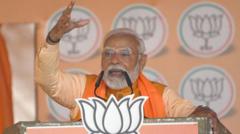The BJP has decisively won 47 of the 70 seats in Delhi's legislative assembly, positioning Prime Minister Modi's government at the helm of India's capital for the first time since 1998. The outcome represents a significant political shift, ending 10 years of governance by the Aam Aadmi Party (AAP), which currently holds 23 seats. The election's aftermath underscores Modi's influential presence amid continuing allegations of corruption against AAP leaders, including former Chief Minister Arvind Kejriwal and his deputy, Manish Sisodia.
Modi's BJP Secures Landmark Victory in Delhi Election

Modi's BJP Secures Landmark Victory in Delhi Election
Prime Minister Narendra Modi's Bharatiya Janata Party (BJP) clinches a historic win in the Delhi Assembly elections after 27 years.
The political climate in Delhi, a vital territory for India’s central government, became a focal point during the campaign, with the BJP investing significant resources to capitalize on AAP's vulnerabilities. Modi and Home Minister Amit Shah played key roles in rallying support for the BJP, a party that has won in several other states in recent elections.
Voter enthusiasm surged, with over 60% turnout, and while forecasts had hinted at a BJP majority, the eventual landslide accentuated the party's narrative of "development and good governance." Modi declared victory on social media, promising to prioritize Delhi's development. Meanwhile, Kejriwal acknowledged the voters' decision and expressed hope for the BJP to meet their expectations.
The AAP's defeat raises questions about its future, as internal dissent and corruption accusations have marred its reputation, especially among middle-class voters who initially supported its platform focused on transparency and public service reform. The BJP, meanwhile, leveraged its expansive organizational reach and campaign strategies to advocate for a cohesive governance model between state and federal leadership.
Potential governance challenges loom, however, as the political landscape in Delhi remains complex. The lieutenant governor, appointed by the federal government, holds significant authority over public order and police functions, often leading to tensions with the local assembly.
The election outcome signals an uncertain prospective for Delhi’s opposition parties, particularly with the Congress party failing to secure any seats despite its historical role in Delhi’s governance prior to AAP’s rise. As the BJP prepares for future electoral contests, this recent victory strengthens its foothold in a strategically important region, while AAP grapples with its declining influence and the implications of its leadership controversies.
Voter enthusiasm surged, with over 60% turnout, and while forecasts had hinted at a BJP majority, the eventual landslide accentuated the party's narrative of "development and good governance." Modi declared victory on social media, promising to prioritize Delhi's development. Meanwhile, Kejriwal acknowledged the voters' decision and expressed hope for the BJP to meet their expectations.
The AAP's defeat raises questions about its future, as internal dissent and corruption accusations have marred its reputation, especially among middle-class voters who initially supported its platform focused on transparency and public service reform. The BJP, meanwhile, leveraged its expansive organizational reach and campaign strategies to advocate for a cohesive governance model between state and federal leadership.
Potential governance challenges loom, however, as the political landscape in Delhi remains complex. The lieutenant governor, appointed by the federal government, holds significant authority over public order and police functions, often leading to tensions with the local assembly.
The election outcome signals an uncertain prospective for Delhi’s opposition parties, particularly with the Congress party failing to secure any seats despite its historical role in Delhi’s governance prior to AAP’s rise. As the BJP prepares for future electoral contests, this recent victory strengthens its foothold in a strategically important region, while AAP grapples with its declining influence and the implications of its leadership controversies.




















